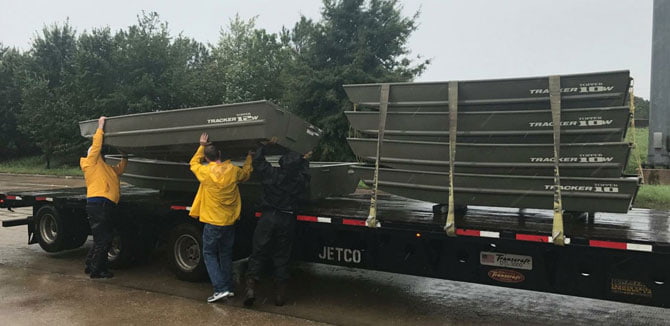Trucking Industry Pulls Together to Aid Houston during Hurricane Harvey

Members of the Texas Trucking Association help to transport a donation of Jon boats to rescue operations throughout Houston.
A few days into Hurricane Harvey, John D. Esparza got a text from a farmer in Brazoria County, Texas, just south of Houston, requesting 300 bales of hay. A rancher in Leon County, Texas, 150 miles north was able to donate the hay, but needed a way to transport it.
Fields are flooded and you have hungry cows,” explained Esparza, president and chief executive of the Texas Trucking Association. “We needed to get the hay to them.”
Within minutes of receiving the request, Esparza was able to plug into his network of 1,100 member carriers to find a free trailer and a driver able to make the trip.
“We’re like an old switchboard operator, receiving calls and connecting people,” he described.
Armed with a clipboard and a cell phone, Esparza’s organization has been working around the clock fielding texts and calls requesting transportation for everything from medical supplies and air filters, to life jackets and Jon boats—flat, rugged crafts used by emergency personnel to reach and rescue stranded flood victims.
As contributions flow in from all corners of the country and walks of life, the trucking industry is finding that its expertise in logistics and ability to quickly get goods from one location to another are especially handy for keeping emergency efforts running smoothly.
“Our thoughts go out to those in Texas and along the Gulf Coast who have been affected by Hurricane Harvey’s devastating toll,” Chris Spear, president and chief executive officer, American Trucking Associations, said in a statement to Lytx. “We in the trucking industry recognize the need for everyone to come together when our communities are suffering, and we are working hard to help by providing emergency transportation, temporary warehouse space and more.”
“We urge everyone in the trucking community to learn how they can help speed up the ongoing recovery efforts by checking into the American Logistics Aid Network and contribute to the effort,” Spear said. “Hurricane Harvey reminds us of the importance of staying safe, wherever we are. In this time of crisis, we need to rally to support those in Texas and beyond who are affected by the disaster.”
The calls Esparza’s organizations field are often for specialized assistance. On Wednesday, the association received a request to help move a trailer blocking a dock being used to receive emergency supplies. “We were able to locate a driver within two miles of the site who could move it and dispatched him,” Esparza said.
While seemingly minor, these assists are critical on a grander scale when they are added up. “Thanks for everyone’s contributions, the queue of emergency requests is getting smaller and smaller because we’re able to put assets together with needs,” he said.
“We in the trucking industry recognize the need for everyone to come together when our communities are suffering, and we are working hard to help by providing emergency transportation, temporary warehouse space and more.”
—Chris Spear, president and chief executive officer, American Trucking Associations
Esparza, who has had experience coordinating volunteer efforts during Hurricanes Katrina and Rita in 2005, said emergency efforts for Harvey have been more organized this time around, with public and private efforts working “hand in glove.” “The good news is that we’ve all learned a lot from those experiences,” he said. “We’ve all been much more prepared and able to help and fill gaps.”
As rescue efforts give way to clean-up, recovery, and reconstruction, Esparza emphasizes the need for continued support after news headlines move on to other topics. “There will be a number of very tough months ahead,” Esparza. “Your continued support, thoughts and prayers will be welcomed and appreciated.”
